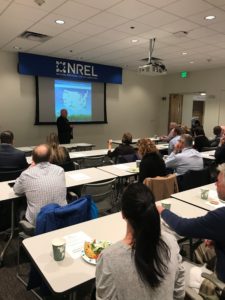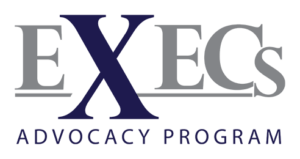In this Capitol Report:
Chamber, Federal Policy Council Visits Newest NREL Facilities
NREL Helps Explore Private Public Partnership Opportunities for Colorado Businesses
 On Tuesday, the National Renewable Energy Laboratory (NREL) hosted the Colorado Chamber, along with representatives from the offices of U.S. Senators Michael Bennett (D-CO) and Cory Gardner (R-CO), to visit the newest of its expanded facilities. NREL partnered with the Chamber’s Federal Policy Council to demonstrate the innovative public-private partnerships NREL has fostered, as well as showcasing the latest breakthroughs in fundamental science, new clean technologies, and integrated energy systems powering our businesses and transforming the way we use energy. NREL is a world-renowned, Department of Energy federal research facility dedicated to advancing renewable energy and energy efficiencies.
On Tuesday, the National Renewable Energy Laboratory (NREL) hosted the Colorado Chamber, along with representatives from the offices of U.S. Senators Michael Bennett (D-CO) and Cory Gardner (R-CO), to visit the newest of its expanded facilities. NREL partnered with the Chamber’s Federal Policy Council to demonstrate the innovative public-private partnerships NREL has fostered, as well as showcasing the latest breakthroughs in fundamental science, new clean technologies, and integrated energy systems powering our businesses and transforming the way we use energy. NREL is a world-renowned, Department of Energy federal research facility dedicated to advancing renewable energy and energy efficiencies.
Located in Golden, NREL is leading research to modernize and secure the North American power grid, where NREL believes scientific investments will have implications for energy security and disaster readiness for decades to come. NREL is also very proud that their Colorado campus represents the largest carbon-neutral facility in the world, where a supercomputer monitors and manages energy use and re-use every second, 24/7.
Additionally, Tuesday’s program highlighted an unprecedented $30 million grant from Wells Fargo to form private-public incubators which are enabling start-ups, entrepreneurs and scientists to partner with researchers at NREL to test and refine renewable energy technologies, and then provide further funding and support to bring these refined technologies to market.*
This Federal Council group also saw firsthand how NREL’s researchers are partnering with traditional industries to build on decades of energy development science in pursuit of new energy technologies. (i.e. NREL is exploring how fracking technology may be a tool for harnessing the earth’s geothermal power and are currently working on making methane renewable for an energy company in California.)
Special thanks go to PrimusWindpower and PrimusAerospace for sponsoring the Chamber’s November Federal Policy Council. To learn more about this policy council, share ideas or ask a question, contact Leah Curtsinger, Federal Policy Director at (303) 866-9641.
*To learn more about the Wells Fargo NREL partnership, contact Lauren Schwartz, director of investor relations at the Chamber.
State Auditor Recommends Changes to Current State Tax Expenditures
This week the Office of the State Auditor (OSA) provided a presentation to the Joint Legislative Finance Committees and gave an overview of their review/evaluation of fifteen (15) current state tax expenditures. During the presentation, the OSA staff discussed their evaluation findings and shared the following with the Joint Committees:
- five (5) current tax expenditures are not meeting their purpose and may need to be reviewed by the Colorado General Assembly;
- seven (7) tax expenditures are meeting their purpose; and
- three (3) tax expenditures may need to be amended in statute to be more effective.
The OSA has issued a report on their findings which can be retrieved here: http://leg.colorado.gov/sites/default/files/documents/audits/2018te1_tax_expenditures_compilation_report_september_2018.pdf
Background:
Senate Bill 203 was adopted by the Colorado General Assembly in 2016, and requires that the State Auditor review all of the State’s existing tax expenditures at least once every five years and issue a report no later than September 14, 2018 and September 15 every year thereafter (39-21-305, CRS). The OSA is also required to evaluate the tax expenditures to determine if they are achieving the objectives intended, including economic development, assisting beneficiaries and promoting the health, safety and welfare of the public. Colorado statute currently defines a tax expenditure as “a tax provision that provides a gross or taxable income definition, deduction, exemption, credit or rate for certain persons, types of income, transactions or property that results in reduced tax revenue.” 39-21-302(2), CRS.
The OSA staff used an evaluation approach for each tax expenditure they reviewed as well as relied on resources such as the National Conference of State Legislatures, the Tax Policy Center, other states’ tax expenditure reviews, and PEW Charitable Trusts to determine intent and policy goals by the General Assembly when the tax expenditure was adopted.
Summary of Evaluation Findings:
The OSA staff determined that the following five (5) tax expenditures are NOT meeting their purpose based on the following rationale:
Occasional Sale of Liquor by Public Auction – likely not being used
Crop Hail Insurance Premium Tax Exemption – likely not being used
Sales to Residents of Bordering States Exemption – not meeting its purpose because exemption cannot be used
Crop & Livestock Contribution Corporate income Tax Credit –not meeting purpose because of its limited use
Agricultural Lease Deduction – not meeting purpose because it has not been used.
The OSA staff determined that the following seven (7) tax expenditures ARE meeting their purpose:
Wholesale Sales Exemption
Sales to Charitable Organizations Exemption
Credit for Taxes Paid to Other States
Newspaper Sales Exemption
Newsprint & Printer’s Ink Sales Exemption
Farm Close-Out Sales Tax Exemption
Hunger Relief Income Tax Credit
The OSA staff determined that the following three (3) exemptions may need further clarification by the General Assembly based on the following rationale:
Sacramental Wines Excise Tax Exemption – the exemption is partially meeting its purpose because it is not applied to all sales and statute may need to be amended.
Long-Term Lodging Exemption – exemption is meeting its purpose but applied inconsistently and statute may need to be amended.
Biogas Production Components Exemption – exemption is meeting its purpose but to a limited extent and could be expanded by amending the statute.
The next step will be for members of the Colorado General Assembly to further review this report and determine whether they would like to repeal or modify any of the current tax expenditures listed above. We will keep the Tax Council apprised of any proposed changes by legislators as the 2019 Legislative convenes on January 4, 2019.
Please contact Loren Furman at [email protected] or at 303-866-9642 if you should have any questions/concerns regarding this matter.
Registration is now OPEN for the 2019 EXECs Advocacy Program!
 The EXECs Advocacy Program delivers experiential insight into prominent Colorado companies. Through business tours and policy-based forums in partnership with key Colorado executives and elected officials, participants learn about the different industries that impact Colorado’s economy. This 9 month program is dedicated to developing a strong network for Colorado’s emerging business leaders, provides participants a strong foundation in policy and advocacy, and creates an environment that enables them to gain perspective on critical issues that impact the different regions of Colorado and the industries that support them. Applications will be accepted through December.
The EXECs Advocacy Program delivers experiential insight into prominent Colorado companies. Through business tours and policy-based forums in partnership with key Colorado executives and elected officials, participants learn about the different industries that impact Colorado’s economy. This 9 month program is dedicated to developing a strong network for Colorado’s emerging business leaders, provides participants a strong foundation in policy and advocacy, and creates an environment that enables them to gain perspective on critical issues that impact the different regions of Colorado and the industries that support them. Applications will be accepted through December.
For more information, please contact the EXECs Advocacy Program Manager Priscilla B. Varner at [email protected]. Submit your application today! https://cochamber.com/get-involved/execs/2019-execs-advocacy-program-application/

